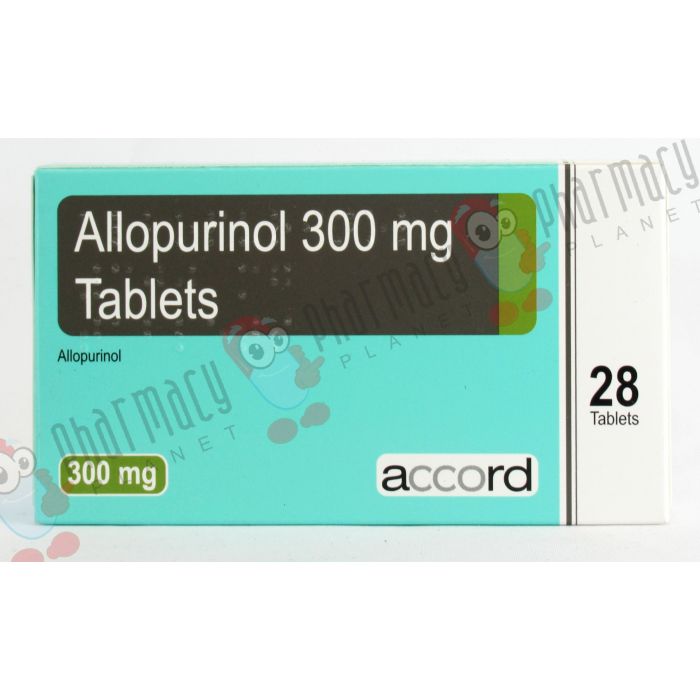People also ask
What is Allopurinol?
Allopurinol is used to reduce urate concentrations in body fluids and in the urine to prevent or eliminate uric acid and urate deposits.
Allopurinol uses include being indicated for the treatment of the main clinical manifestations of uric acid/urate deposit. These manifestations are gouty arthritis, cutaneous tophi, and kidney disease with crystal deposition or stone formation.
These manifestations occur in:
- idiopathic gout
- uric acid lithiasis.
- acute uric acid nephropathy
How does it work?
This medication, specialised in treating gout in the foot and ankle, is a xanthine oxidase inhibitor. Allopurinol and its main metabolite oxypurinol decrease the level of uric acid in plasma and urine by inhibition of xanthinoxidase, an enzyme that catalyzes the oxidation of hypoxanthine to xanthine and of xanthine to uric acid.
What are the benefits of taking it?
Allopurinol Ratiopharm tablets contain allopurinol as an active ingredient. It is indicated for the treatment of gout, as well as for the high levels of uric acid produced by renal failure, by neoplastic or enzymatic diseases; also for the prevention and treatment of uric acid and calcium oxalate stones. Allopurinol lowers uric acid level in plasma and urine
How do I use it and its dosage?
Always use this gout medication (Allopurinol) exactly as your doctor has told you. If in doubt, consult your doctor or pharmacist again.
The recommended dose is:
Adults:
- 100 to 200 mg a day in minor disorders.
- 300 to 600 mg (1-2 tablets) a day in moderately severe conditions.
- 700 to 900 mg (2-3 tablets) a day in severe conditions.
Children under 15 years:
Up to a maximum of 400 mg per day administered in 3 doses. The use in children is rarely indicated, except in malignant processes (especially leukemia) and certain enzymatic alterations.
Use in the elderly:
In the absence of specific data, the lowest dose that produces a satisfactory reduction in urates should be used. Particular attention should be paid to the dose in cases of impaired renal function.
The recommended dose in impaired renal function:
In severe renal failure, it is advisable to use less than 100 mg per day or to use single doses of 100 mg at intervals greater than one day.
The recommended dose in liver failure:
In patients with hepatic impairment, the dose should be reduced. Periodic liver function tests are recommended during the initial stages of treatment.
The recommended dose in cases of renal dialysis:
If dialysis treatment is performed 2 or 3 times per week, the alternative of a dose of 300 to 400 mg of Allopurinol 300 should be considered immediately after each dialysis session without any treatment being administered on the days when do not apply kidney dialysis
The recommended dosage of Allopurinol for acute gout attacks:
In the initial stages of treatment with Allopurinol 300, as well as uricosuric drugs, an attack of gouty arthritis may be triggered. This is normal and you should not stop taking the tablets, the doctor will prescribe the appropriate treatment.
Side effects & precautions
Like all medicines, this medicine can cause side effects, although not everybody gets them.
Infections and infestations
- Very rare: Hair follicle infection
Blood and lymphatic system disorders:
- Very rare: Decreased number of white blood cells (increases the risk of infection), red blood cells (can make you tired, fatigue), platelets.
Immune system disorders
- Uncommon: Hypersensitivity reactions
- Very rare: Angioimmunoblastic lymphadenopathy (inflammation in armpits, neck, groin).
Metabolism and nutrition disorders
- Very rare: Diabetes mellitus, increased blood lipid levels
Psychiatric disorders
Nervous system disorders
- Very rare: coma, paralysis, poor coordination of movements, altered sensation, drowsiness, headache, altered taste
Eye disorders
- Very rare: Cataracts, visual disturbances
Ear and labyrinth disorders
Cardiac disorders
- Very rare: Chest pain or slowing of the pulse
Vascular disorders
- Very rare: high blood pressure
Gastrointestinal disorders
- Uncommon: Vomiting, nausea, diarrhea
- Very rare: Appearance of blood in vomiting, excess fat in stool, infections of the mouth, changes in bowel habits
Hepatobiliary disorders
- Uncommon: Asymptomatic increases in liver function tests
- Rare: Hepatitis
Skin and subcutaneous tissue disorders
Frequent: rash
- Very rare: Serious skin rashes: Stevens-Johnson syndrome (SJS) and toxic epidermal necrolysis (NET), alopecia, hair discoloration.
Musculoskeletal and connective tissue disorders
Renal and urinary disorders
- Rare: Calculations in the urinary tract
- Very rare: Appearance of blood in the urine
Reproductive system and breast disorders
- Very rare: Male infertility, erectile dysfunction, increased breast size
General disorders and administration site conditions
- Very rare: Bloating, malaise, fatigue, fever
Warnings and precautions.
Allopurinol should be stopped immediately as soon as a skin rash or any other evidence of hypersensitivity, which can happen at any time during the treatment.
Once mild skin reactions have subsided, if present, you can restart the allopurinol treatment, if necessary, at a lower dose (such as 50 mg/day), increasing it gradually.
In the event of recurrences, the administration of allopurinol, as it may otherwise lead to hypersensitivity reactions more severe (see immune system disorders).
If angioimmunoblastic lymphadenopathy occurs, it may revert after discontinuation of treatment
with allopurinol. Dose reduction should be considered in patients with hepatic or renal impairment. Very rarely, reports of thrombocytopenia, agranulocytosis, and aplastic anemia have been received.
particularly in individuals with impaired kidney and/or liver function, highlighting the need for special caution in this group of patients.
Buying Allopurinol online.
You can buy Allopurinol online through one of the UK’s leading online pharmacies, Pharmacy Planet. It's easy and convenient. You will need to fill out a short assessment and the item will be delivered directly to your door. If you want to buy Allopurinol online, use Pharmacy Planet, a UK pharmacy you can trust.














